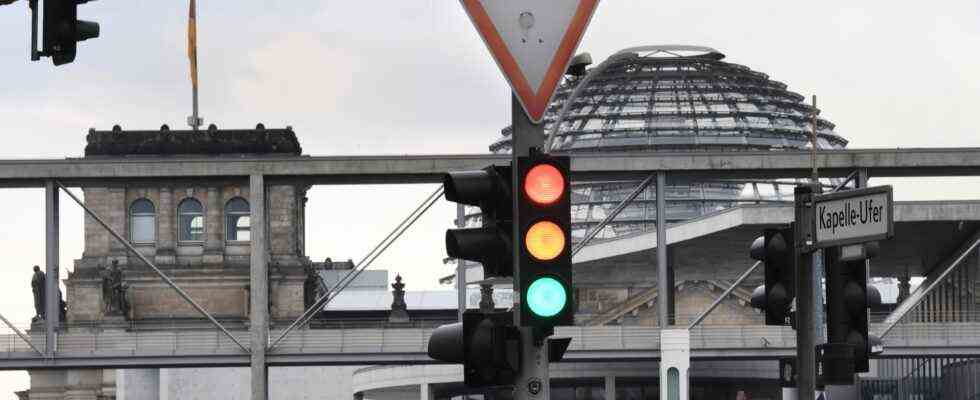Status: 10/01/2021 9:07 a.m.
Before the second round of so-called preliminary explorations with the FDP, the Greens are signaling a willingness to compromise – for example with regard to the speed limit. In the Union, on the other hand, hopes of government participation are crumbling.
Five days after the federal elections, the parties are starting the explorations for the formation of a new government. The Greens and FDP are meeting today for their second round of talks, which will focus more specifically on the content and goals of a possible future coalition.
The Greens and FDP initiated talks on forming a government on Tuesday. Before the renewed meeting, there are the first steps towards rapprochement: The chairman of the Green parliamentary group, Anton Hofreiter, signaled willingness to talk on the subject of the speed limit. “I do not believe in making individual measures a condition, that complicates the negotiations and does not do justice to our task,” he told the “Rheinische Post” and the Bonn “General-Anzeiger”. Although the Greens went into talks with the “entire positions”, “this also includes a speed limit of 130 on motorways”. However, it is “now not about dashes, but about a departure for climate neutrality, progress and justice”.
For its part, the FDP emphasized the importance of deleting criminal law paragraph 219a, which makes advertising for abortion a punishable offense, for coalition negotiations. This concern connects the FDP and the Greens. The Union, however, wants to keep §219a.
Important course setting
Which issues the Greens and FDP negotiate with each other can have a major impact on further explorations – because ultimately the question is whether the Greens and FDP will decide together for an SPD or a Union-led coalition, i.e. a so-called traffic light or a Jamaica coalition. Alliance.
According to a survey by the opinion research institute Infratest dimap, more people trust a coalition of the SPD, Greens and FDP to make a new political start than an alliance of the Union, Greens and FDP. 51 percent of those surveyed in the GermanyTrend for the ARD morning magazine stated that a traffic light alliance would most likely stand for a fresh start, only 18 percent think so of a Jamaica coalition. For 24 percent, neither of the two options stands for a fresh start.
The SPD and the Union will start talks on Sunday. Before that, the CSU top meets on Friday. The party presidium wants to set the course for the explorations in a video conference.
Clashes in the Union
Things are simmering within the Union in the run-up to the talks. Friedrich Merz, a member of the so-called future team of Union Chancellor candidate Armin Laschet (both CDU), sharply criticized his party. “The CDU has become lazy,” said the ex-Union faction leader in the newspapers of the Funke media group. “The Union has forgotten how to work thematically. This applies to its content orientation as well as to its presence on the topics and the people.” That must now be worked out again – “regardless of whether in the government or in the opposition”.
Union parliamentary group vice Carsten Linnemann (CDU) called on his party to “humility”. “The Union as a people’s party must now show style, including humility, attitude,” said Linnemann in the ARD morning magazine. The CDU must now work through the election and clearly identify mistakes “in order to then create a renewal process at the end.”
Linnemann admitted that a traffic light coalition made up of the SPD, Greens and FDP had the best chance of forming a government. “The probability that there will be a traffic light is not only obvious, it is very high,” said the CDU politician. “The SPD won the election, and you don’t just have to admit that, you have to admit it, that’s the way it is. We lost.”
Deputy CDU / CSU parliamentary group leader Linnemann on the state of the CDU
Morning magazine, October 1st, 2021
Criticism of Laschet
Several East German CDU district associations not only criticized the state of the party, but also took a resolute position against party leader Laschet. From the point of view of many people, the Rhinelander was the wrong candidate, wrote the CDU district executive in Altenburger Land in Thuringia in an open letter to the party headquarters. The option to participate in the next federal government must remain. “However, that cannot happen with Armin Laschet.”
In view of these fronts, the former CDU chairman Annegret Kramp-Karrenbauer felt compelled to call on the Union to unite before the talks with the Greens and the FDP. “Decisive for the question of whether there will be a future coalition in the Jamaica format in the end, are the content and the support of all those responsible,” she told the dpa news agency. “The Union must now start talks with broad support for the chairmen of the CDU and CSU.”
Advantage for the SPD?
In view of the dispute with the competition, SPD chancellor candidate Olaf Scholz again campaigned for the alliance he was striving for with the Greens and FDP. “I am optimistic that a traffic light coalition can succeed,” said Scholz to “Spiegel”. The Germans would have made the SPD, Greens and FDP stronger with their votes. “This is a message to these three that we can now get this done and form a government together.”
The CDU and CSU fell to the historic low of 24.1 percent in the federal election last Sunday. The SPD was the strongest force with 25.7 percent. The Greens came third with 14.8 percent, followed by the FDP with 11.5 percent.

